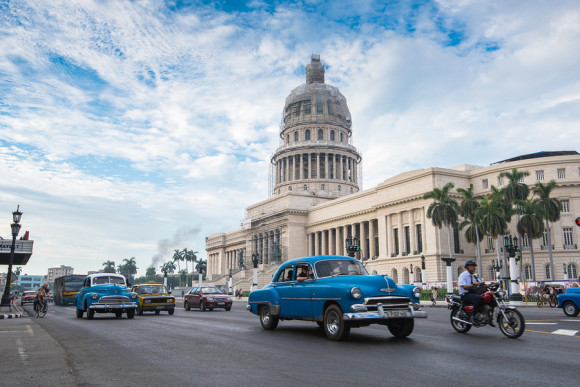The Trump administration said on Monday it would allow lawsuits by U.S. citizens against dozens of Cuban companies and other entities on Washington’s blacklist but will maintain, for now, a ban against suing foreign firms doing business on the communist-ruled island.
The move marked an intensification of U.S. pressure on Cuba and also appeared aimed at punishing Havana over its support for Venezuela’s socialist president, Nicolas Maduro. But it stopped short of the more severe step of targeting foreign investments in Cuba – though it left the door open to doing so in the future.
Lawsuits in U.S. courts against Cuban enterprises, many linked to military and intelligence services, will be permitted beginning on March 19. But Washington will keep in place until at least April 17 a ban on legal action against foreign firms using property confiscated by the Cuban government since the 1959 revolution, the State Department said.
Every U.S. president has suspended on a rotating six-month basis a section of the 1996 Helms-Burton Act that would allow such lawsuits by Cuban-Americans and other U.S. citizens due to opposition from the international community and fears it could create chaos in the U.S. court system with a flood of legal claims.
But President Donald Trump’s administration first announced in January a 45-day review of the matter and has now added another 30 days for further study while allowing the act’s controversial Title III on private legal actions to be partially activated for the first time.
Cuban Foreign Minister Bruno Rodriguez said he “strongly rejected” the U.S. action against Cuban companies “arbitrarily sanctioned” by the Trump administration. The 30-day waiver for other cases, he said in a message on Twitter, amounted to an “unacceptable threat against the world.”
A complete lifting of the ban could let potentially billions of dollars in legal claims move forward in U.S. courts and likely antagonize Canada and U.S. European partners, whose companies have significant business holdings in Cuba.
It could also affect some U.S. companies that have begun investing in the island since former President Barack Obama’s opening to the old Cold War foe.
Allowing the provision to go into effect even on a limited basis could undermine efforts by Cuban President Miguel Diaz-Canel to foster foreign investment and promote tourism to bolster the Caribbean island’s fragile economy.
“The decision today adds obstacles to our development and economic goals, but the United States will continue to fail in its central aim of subjecting the sovereign will of Cubans by force,” Cuba’s foreign ministry said in a statement.
CANADA, EUROPEANS
A senior State Department official said the Trump administration had consulted with Canada and European partners in deliberations on how to proceed.
Under Monday’s announcement, lawsuits will not be authorized against foreign partners in joint ventures with the Cuban government, the official told reporters.
The administration had initially prepared to open the door wider to litigation, exempting only U.S. companies and those from allied countries, but it decided in the end on a more limited approach for now, a person familiar with the discussions said.
Among the foreign companies heavily invested in Cuba are Canadian mining firm Canadian Sherritt International and Spain’s Melia Hotels. U.S. companies, including airlines and cruise companies, have forged business deals in Cuba since the easing of restrictions under Obama.
U.S.-Cuban relations have nosedived since Trump became president, partially rolling back the detente initiated by Obama and reverting to Cold War-style rhetoric. A six-decade-old U.S. economic embargo on Cuba has also remained officially intact.
With Monday’s announcement, the administration made clear that it was not only acting because of what the State Department official called “the Cuban state’s repression of its own people” but also to send a message about Havana’s role in Venezuela.
“Cuba continues to maintain close relations to Russia and China and has destabilized Venezuela, leading to mass flows of refugees and of course public health threats,” the official said.
Trump aides have regularly denounced Cuba for what they say is political and security assistance helping Maduro to keep his grip on power since opposition leader Juan Guaido invoked the Venezuelan constitution in January and swore himself in as interim president.
Washington and dozens of other countries have recognized Guaido, but Maduro, who says he is being targeted by a U.S.-directed coup attempt, is backed by Cuba as well as Russia and China and retains control of state institutions, including the military.
Trump’s toughened stance on Cuba as well as Venezuela has gone down well in the large Cuban-American community in south Florida, an important voting bloc in a key political swing state as he looks toward his re-election campaign in 2020.
John Bolton, who became Trump’s national security adviser last April, called Cuba and its top allies Venezuela and Nicaragua a “troika of tyranny” in Miami speech in November.
(Reporting By Matt Spetalnick, Patricia Zengerle and Lesley Wroughton; writing by Matt Spetalnick; editing by Susan Thomas and Cynthia Osterman)
Topics Lawsuits USA Politics Washington Canada
Was this article valuable?
Here are more articles you may enjoy.



 Fla. Commissioner Offers Major Changes to Citizens’ Commercial Clearinghouse Plan
Fla. Commissioner Offers Major Changes to Citizens’ Commercial Clearinghouse Plan  AI Claim Assistant Now Taking Auto Damage Claims Calls at Travelers
AI Claim Assistant Now Taking Auto Damage Claims Calls at Travelers  Insurance Broker Stocks Sink as AI App Sparks Disruption Fears
Insurance Broker Stocks Sink as AI App Sparks Disruption Fears  Preparing for an AI Native Future
Preparing for an AI Native Future 

